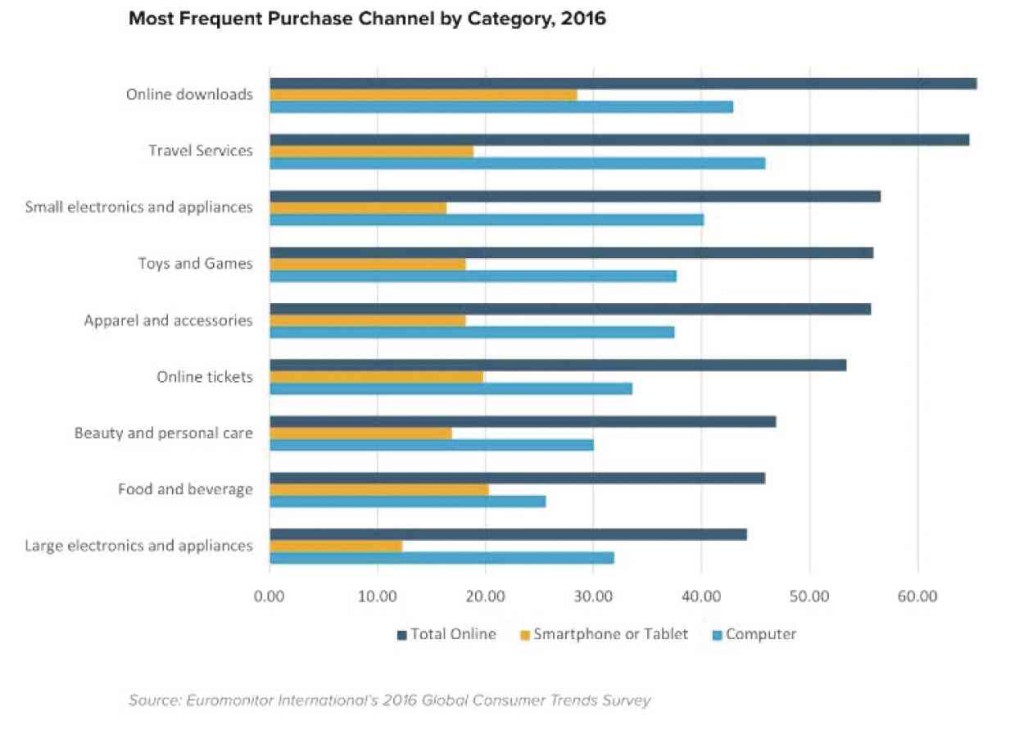Growth of digital commerce, domination of Asia top trends list
 Amid a “backdrop of uncertainty” brought about by certain political events—Brexit, Trump’s presidency—no rollback is expected on global climate initiatives; new digital services are seen to propel digital commerce growth, and Asia-Pacific is expected to hit 40 percent of global production output.
Amid a “backdrop of uncertainty” brought about by certain political events—Brexit, Trump’s presidency—no rollback is expected on global climate initiatives; new digital services are seen to propel digital commerce growth, and Asia-Pacific is expected to hit 40 percent of global production output.
These are just some of the worldwide economic and consumer forecasts by market research firm Euromonitor International in its recent report, “Global Consumers and Economies 2017.”
The report identifies three top trends under the following topics: business dynamics; cities; economy, finance and trade; industrial; natural resources; digital consumer; households, income and expenditure; and population.
With a Trump presidency, Euromonitor states that in terms of economy, finance, and trade, “the main downside risks are worse-than-expected increases in trade tariffs and immigration restrictions, which could cause a downturn in the US economy, with GDP growth falling to 0.9 percent.
Milder implications, combined with the larger-than-expected and more effective stimulus of infrastructure spending and tax reforms, could result in US GDP growth of 2.8 percent.”
Political risks also threaten to impede economic growth in the United Kingdom, thanks largely to Brexit, adds the report.
Over in China, the economic uncertainty stems from the increasing pressure of an over-indebted Chinese corporate sector.
“China’s private nonfinancial sector debt to GDP was estimated at over 200 percent in mid-2016, rising nearly two times faster than the country’s GDP. Bad loans are a particular cause for concern, adding to a high probability of a banking crisis over the next three years,” the report reads.
These economic uncertainties could have a global spillover, the report continues, when it comes to business dynamics, which “seems to be influenced by opposing forces”: On the one hand, Trump’s presidency and Brexit pose risks in increasing trade barriers, “as popular discontent with globalization feeds support for populist and far-right parties.”
On the other hand, however, both the US and UK, as well as Canada, have laid plans to increase infrastructure investment to boost economic growth.
“In the US, it is reported that Trump is planning to invest $1 trillion in infrastructure over a period of 10 years,” the briefing states. “Although it is not yet clear what the exact spending will constitute, it is broadly believed to include airports, highways, bridges and pipelines.”
Rapid urbanization is also pushing investments in infrastructure development in emerging economies, the report adds.
As businesses embark on their respective digital transformations this year, more people will find that the line between work and life will become increasingly blurred—work-life balance will slowly give way to work-life integration.
“Work will be more about what people do, not where or when. The future of work is about results, not the process or the time spent; it’s also about connectivity,” the report states.
“Workers are expected to be available at any time, not just between the hours of 9-5, and regardless of whether they are in the office.”
Euromonitor presents more positive trends when it comes to industrial production, especially in the Asia-Pacific region which, the report states, “remains at the forefront of top growth areas,” and is expected to be responsible for 40 percent of global production output this year.
Production output in the Philippines, as well as China and India, is expected to grow 10 percent, adds the report.
The pharmaceutical industry, in particular, is expected to accelerate production thanks to a number of innovations.
The report also notes that “oil and gas prices are expected to recover in 2017, thanks to declining extraction activities in non-OPEC (Organization of the Petroleum Exporting Countries) countries and recovering global demand for oil products.”
Progress is also expected when it comes to global climate initiatives, and Euromonitor forecasts a “new era of sustainability.”
The momentum to make resource management a key priority is growing and ushering in a new normal, driven by both demand and supply sides. From the demand side, growing eco-awareness is leading consumers to pressure companies for stronger green credentials,” the report states. “On the supply side, fast depletion of resources triggered by population and economic growth, as well as fears over security of supplies, mean that key inputs are under stress.”
In line with this, Euromonitor sees more and more companies embracing the “circular economy”—a business model which ensures that everything is reused and nothing is wasted.
Key trends regarding the digital consumer, of course, should remain top priority for businesses worldwide. Euromonitor states that “global consumers reported that more service-oriented purchases, including media downloads, online tickets and foodservice online orders, were their most frequent mobile purchases. In particular, the variance between devices used for a foodservice online order was the narrowest of all categories, with 26 percent of global consumers reporting having made such a purchase on a computer as compared with 20 percent on a mobile.”
It is apparel and footwear, however, that is expected to drive digital commerce growth this year, with Euromonitor estimating this category to contribute around $31.4 billion in terms of absolute value globally to online sales.














